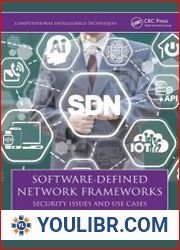
BOOKS - NETWORK TECHNOLOGIES - Software-Defined Network Frameworks Security Issues an...

Software-Defined Network Frameworks Security Issues and Use Cases
Author: Mandeep Kaur, Vishal Jain, Parma Nand
Year: 2024
Format: PDF
File size: 13.8 MB
Language: ENG
Year: 2024
Format: PDF
File size: 13.8 MB
Language: ENG
Software-Defined Networks (SDN) work by virtualization of the network and the Cognitive Software-Defined Network (CSDN) combines the efficiencies of SDN with cognitive learning algorithms and enhanced protocols to automatize SDN. Partial deployment of SDN along with traditional networking devices forms a Hybrid Software-Defined Network (HSDN). Software-Defined Network Frameworks: Security Issues and Use Cases consolidates the research relating to the security in SDN, CSDN, and Hybrid SDNs. The security enhancements derived from the use of various SDN frameworks and the security challenges thus introduced, are also discussed. Overall, this book explains the different architectures of SDNs and the security challenges needed for implementing them. Software?Defined Network (SDN) is an emerging approach as a new network innovation architecture that has overcome the limitations of traditional network architecture to adapt to dynamic environments. With SDN, the data plane can be separated from control plane and hence the system abstraction has increased. Defining and understanding the control and management software stack for SDN is indeed important. In addition to centralized network control, the current state of the OpenFlow model which is the well?known SDN protocol can also be explored. Network Function Virtualization (NFV) is another promising technology with many benefits like easy management and utilization of resources, reduction of the operational cost, and migration of network functions from a dedicated hardware scenario to virtual machines.
















































